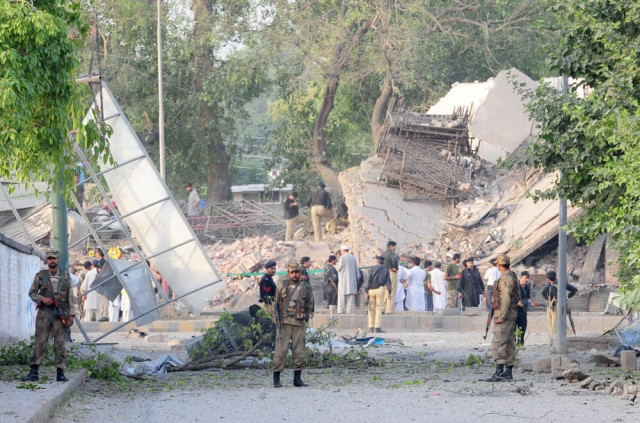9/11 brings slow death to Peshawar
Few could have imagined events of September 11, thousands of miles away would touch the lives of people in Peshawar.

9/11 brings slow death to Peshawar
Few could have imagined that the events of September 11, 2001, thousands of miles away would touch their lives in the bustling frontier city near the Afghan border.
But over the decade since then, Peshawar has itself been targeted repeatedly by militants opposed to Pakistan's cooperation in the US war on militancy.
These days the city is a magnet for suicide bombers rather than the tourists and traders who once made its economy vibrant.
"I come to my shop every morning but I don't know if I am going to go home alive or in a body bag," said Sheikh Arshad, who repaired his minivan after it was damaged in a bombing and then had to sell it to keep his herbal medicine shop afloat.
"When 9/11 happened I had no idea it would bring such destruction to my business, to my city. There is nothing anyone can do. The police come after every bombing, take down our names and promise compensation. But nothing happens."
Rich history, uncertain future
For centuries Peshawar was a crossroads of culture and trade between Afghanistan, South Asia, Central Asia and the Middle East. It is also the gateway to the Khyber Pass, which sits on the ancient Silk Road and leads to the Afghan border.
The city fired imaginations in modern times too.
During the 1980s, Peshawar became a den of spies and jihadis when the United States, Saudi Arabia and Pakistan covertly funded a guerrilla war to expel Soviet troops from Afghanistan.
At one point it was home to Osama bin Laden and other high-profile militants, long before he became the United States' enemy number one.
But there is little magic left in Peshawar.
Destructive changes brought by 9/11 were subtle at first. Trade with neighbouring Afghanistan fell gradually after a US-led invasion toppled the Taliban there in 2001.
Remnants of the regime fled over the porous border to the northwest and established sanctuaries close to Peshawar.
But Peshawar really started feeling the heat after a full-scale war erupted between the state and homegrown Taliban when former President Pervez Musharraf's forces launched an armed assault on militants in Islamabad's Red Mosque in 2007.
Peshawar was soon swept up in government offensives and counter-attacks by militants. Suicide bombings rocked the city, killing hundreds of people over the years.
No one seems safe from the carnage.
Eight-year-old schoolboy Asghar Khan was walking with some friends last month when a bomb hidden in a fruit cart was detonated remotely, killing him. Five policemen, who appeared to be the target of the attack, also died.
"Really, if the 9/11 incident had not occurred, Asghar would have still been with us," said his uncle, Ashfaq Khan. The boy's 60-year-old father was still too shaken to speak. He just held up a photograph of Ashgar.
Once an easy-going centre of culture in a picturesque valley, today Peshawar feels like a city under siege.
Soldiers in machinegun nests are stationed across what was known long ago as the City of Flowers and many commercial buildings are protected by sandbags and barbed-wire fences.
Ijaz Ahmed, who heads police operations in Peshawar, stood in his office a few feet away from photographs of fallen comrades in the war against militants. He reflected on
Peshawar's history since 9/11, and its uncertain future.
"Peshawar has become the frontline city," he said. "And it has suffered the most from the violence."
The psychological scars are deep. Post-traumatic stress disorder is on the rise.
"Before 9/11, I'd see maybe one in a hundred cases where a child was suffering from depression. Now it's one in every seven," said psychiatrist Khalid Mufti.
Economy, culture throttled
Peshawar's economy has taken a battering too.
Half of the city's industrial zone has shut down since 2007 and output in the remaining plants has dropped by 50 percent, says the provincial chamber of commerce and industry.
"Commercial banks are reluctant to extend loans because of insecurity and there has been no major financing in years," said Osman Bashir Bilour, the chamber's president.
Merchants at Peshawar's famous Qissakhwani bazaar, which thrived for centuries, are barely surviving. All they can do is long for the city's past glory.
"The Americans, the Canadians, the Japanese, the Germans, they always bought my merchandise," said Bashir Ahmed, referring to traditional ethnic Pashtun caps, sitting near photographs of Western customers from over the years. "Now no one is coming. It's close to lunchtime and I have not sold one cap today."
The spread of militancy here was a reaction to the American presence in Afghanistan and the post-9/11 alliance between Washington and Islamabad. But it's not just the violence that has reshaped Peshawar.
In 2002, a religious political coalition sympathetic to the Taliban came to power in Peshawar and banned what they deemed un-Islamic activities. Film, music, theatre and art, essential parts of Peshawar's cultural identity, were suppressed.
"Artists have run away. I get thousands of threats. Artists have moved to other cities. All the productions are done there now. Here we can't even breath," said a theatre director, who can't find work and was too scared to be named. "It went bad after 9/11. The violence is so intense now that no one remembers who started it."













COMMENTS
Comments are moderated and generally will be posted if they are on-topic and not abusive.
For more information, please see our Comments FAQ